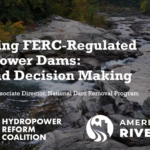Thirty years ago, grassroots advocacy and management collaboration changed the face of river recreation. Paddling once occurred as the snow melted and during a decent rainstorm. Today, enthusiasts paddle on scheduled hydropower dam water releases from early Spring to November. While the season, number of days, volume, and time of day vary, you can usually plan your day around the schedule of posted flows in Maine, Massachusetts, and Maryland to the Carolinas, Georgia, Alabama, California, Oregon, and Washington. Scheduled hydropower releases have created and revitalized river communities and their river-based economies and livelihoods. As precedent-setting licenses come up for renewal, how are practitioners approaching the process to continue the successes achieved and respond to external social and environmental realities?
This webinar describes elements of the hydropower licensing process from the perspective of its evolution and trajectory since members of the public started participating in the 1990s. Understanding both these arcs of change, including responses to external environmental and economic influences, can inform today’s practitioners on how to pursue balance among hydro policy and practice, channeling the verve of stewardship toward the ever-evolving sophistication of industry and community partners.
Discussion topics include:
– Explore how relationships can foster changes in law or precedent that can create opportunities for history-altering actions.
– Examine the evolution of hydropower relicensing since the involvement of the public in the 1990s. – Acquire insights, lessons learned, and tips for being an effective hydropower practitioner today.
– Investigate how the early license process has informed the current process
– Explore the needs and motivations of the new generation of hydro practitioners.
– Examine how the new generation can apply innovative approaches to support public use, underserved communities, and environmental restoration.
– Identify what practitioners can do to leverage to inspire and support staff and volunteers.
– Illustrate trends in accessibility at project sites and their implications for future relicensing efforts.
This webinar will explore concepts outlined in the Hydropower Licensing 101 Toolkit, specifically in the following areas: “The Licensing Process”, “Collaboration and Negotiation”, “Environmental Justice & Equity”. This session also aligns with the following core competencies identified in the document “Technical Core Competencies: River Management Specialists and Non-Specialists”: Other Relevant Laws, Policies and Tools for River Management, River Management Planning.
Presenters: Mark Zakutansky, Peter Skinner, Alex Barham, Thomas J. Christopher, Theresa Lorejo-Simsiman, Kevin Mendik, Pope Barrow, Bob Nasdor, and Bruce Carpenter


 HRC or member-contributed
HRC or member-contributed